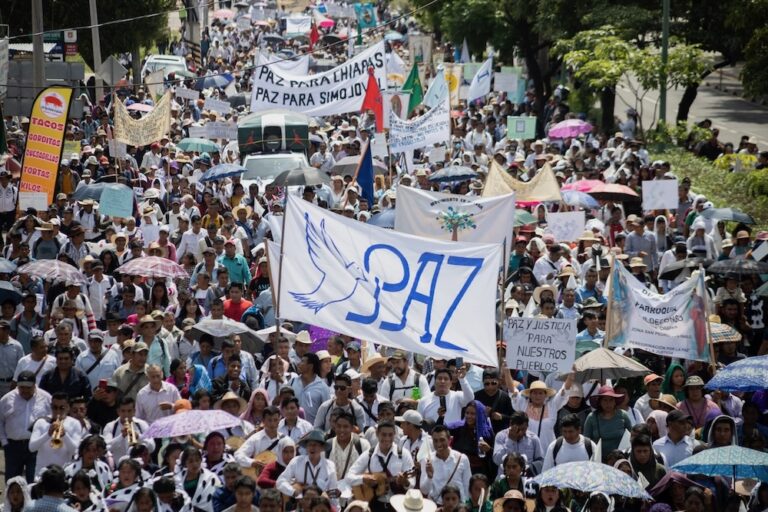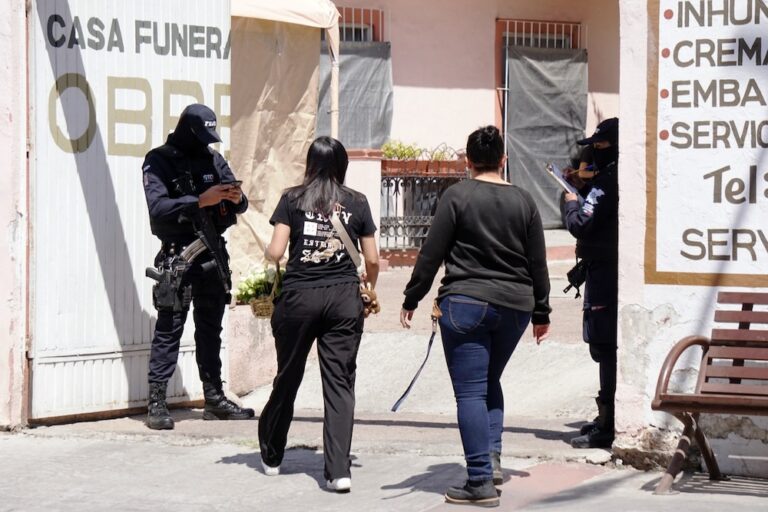In 2016, a year before her death, Breach began receiving threats and pressures due to her reports on violent displacements in the Sierra Tarahumara and her investigations into the connections between drug trafficking groups and local politicians.
This statement was originally published on en.sipiapa.org on 21 March 2025.
The IAPA campaign “Voices Claiming Justice” marks eight years since her murder
As part of its campaign “Voices Claiming Justice”, the Inter American Press Association (IAPA) remembers journalist Miroslava Breach Velducea, who was murdered in Mexico in 2017. The hemispheric organization urges the authorities to bring all perpetrators and the mastermind behind the crime to justice, ensuring accountability and ending the impunity surrounding the case.
On March 23, 2017, early in the morning, a man shot Breach eight times while she was in her car preparing to take one of her two children to school. The child was unharmed in the attack. Breach, 54, was murdered in the city of Chihuahua, the capital of the state of the same name, in northwestern Mexico – “one of the states where organized crime has remained entrenched for years.”
Breach was a correspondent for the Mexico City-based newspaper La Jornada, a contributor to El Norte de Chihuahua, and previously served as editorial director of El Norte de Ciudad Juárez in Chihuahua. With over 20 years of journalism experience, she was recognized for her coverage of human rights violations, environmental conflicts, drug trafficking, and corruption in Chihuahua.
In 2016, a year before her death, she began receiving threats and pressures due to her reports on violent displacements in the Sierra Tarahumara and her investigations into the connections between drug trafficking groups and local politicians. In several articles, she described how drug cartels had infiltrated municipalities in Chihuahua and exposed the alleged links between security officials and criminal groups such as Los Salazar, a faction associated with the Sinaloa Cartel.
According to media reports, her murder was likely an act of vengeance by this criminal group, who felt “betrayed” by her investigative work – topics that most local media avoided out of fear of retaliation and for their own safety. However, Breach believed that silence meant “complicity,” and she continued her reporting. Her journalism ultimately led to her assassination, as revealed in the trial of one of the accused.
Propuesta Cívica, the organization providing legal representation in the case, stated that as of January 2024, the mastermind behind the killing had been identified, and two convictions had been secured. Hugo Amed Schultz Alcaraz, former mayor of the municipality of Chínipas – Breach’s hometown – was sentenced to eight years in prison for aiding in the crime. He is scheduled for a hearing in April to request conditional release.
Three individuals were identified as direct perpetrators of the murder. Juan Carlos Moreno Ochoa, alias “El Larry,” a hitman leader for Los Salazar, was sentenced to 51 years and three months in prison. Ramón Andrés Zavala was executed on December 19, 2017, in Sonora. Wilbert Jasiel Vega Villa remains a fugitive.
Arrest warrants remain outstanding for Crispín Salazar, leader of Los Salazar and the alleged mastermind behind the crime, as well as for Vega Villa, another perpetrator. With the legal process incomplete, it appears that authorities “have settled for these two sentences, leaving justice half-served – which, in reality, is complete impunity,” emphasized Sara Mendiola Landeros, executive director of Propuesta Cívica.
The case, which was transferred to the jurisdiction of the Special Prosecutor’s Office for Crimes Against Freedom of Expression (FEADLE, for its Spanish acronym), has been criticized for investigative failures, including overlooked leads and evidence, politicians who were never interviewed, irregularities at the crime scene, inconsistencies in the evidence, and media leaks that distracted public attention.
In 2019, the Colectivo 23 de Marzo, a group of Mexican journalists, collaborated with international organizations Forbidden Stories, Bellingcat, and the Latin American Center for Investigative Journalism (CLIP, for its Spanish acronym) to publish a report on the case. The report emphasized the threats Breach received related to her articles, “the warnings she gave about the danger she was in, and the clues she left in her publications before her assassination on March 23, 2017 – clues the authorities failed to investigate.”
Carlos Jornet, second vice president of IAPA and president of its Committee on Freedom of the Press and Information, acknowledged that “fully resolving crimes against journalists by identifying and prosecuting all those involved is a long and difficult process. However,” Jornet added, “it is an essential challenge for Mexico’s justice system, which must not give in to neglect, resignation, or forgetfulness.”
Jornet, who is also the editorial director of the Argentine newspaper La Voz del Interior, further stated that “ending the impunity surrounding these crimes is crucial to guaranteeing freedom of expression and press freedom.”
A year ago, IAPA launched the “Voices Claiming Justice” campaign, aimed at keeping the memory of murdered journalists in the Americas alive, highlighting their journalistic work, and continuously urging authorities to end the impunity that surrounds most of these crimes by seeking justice.



